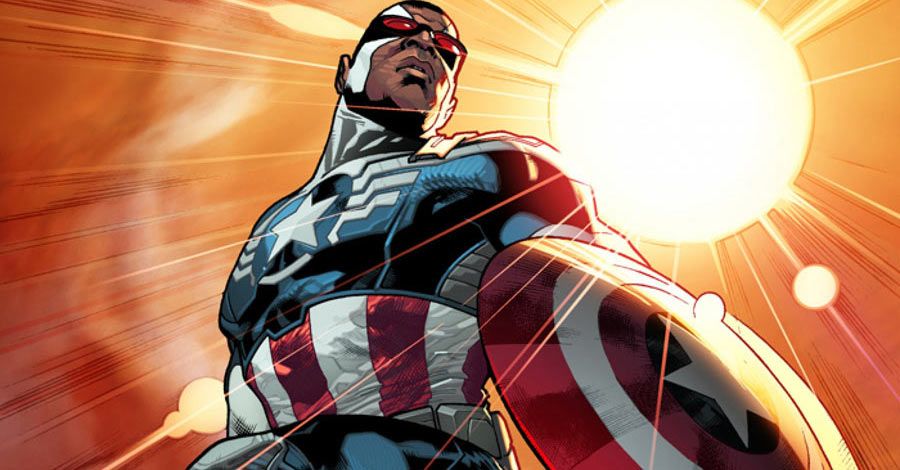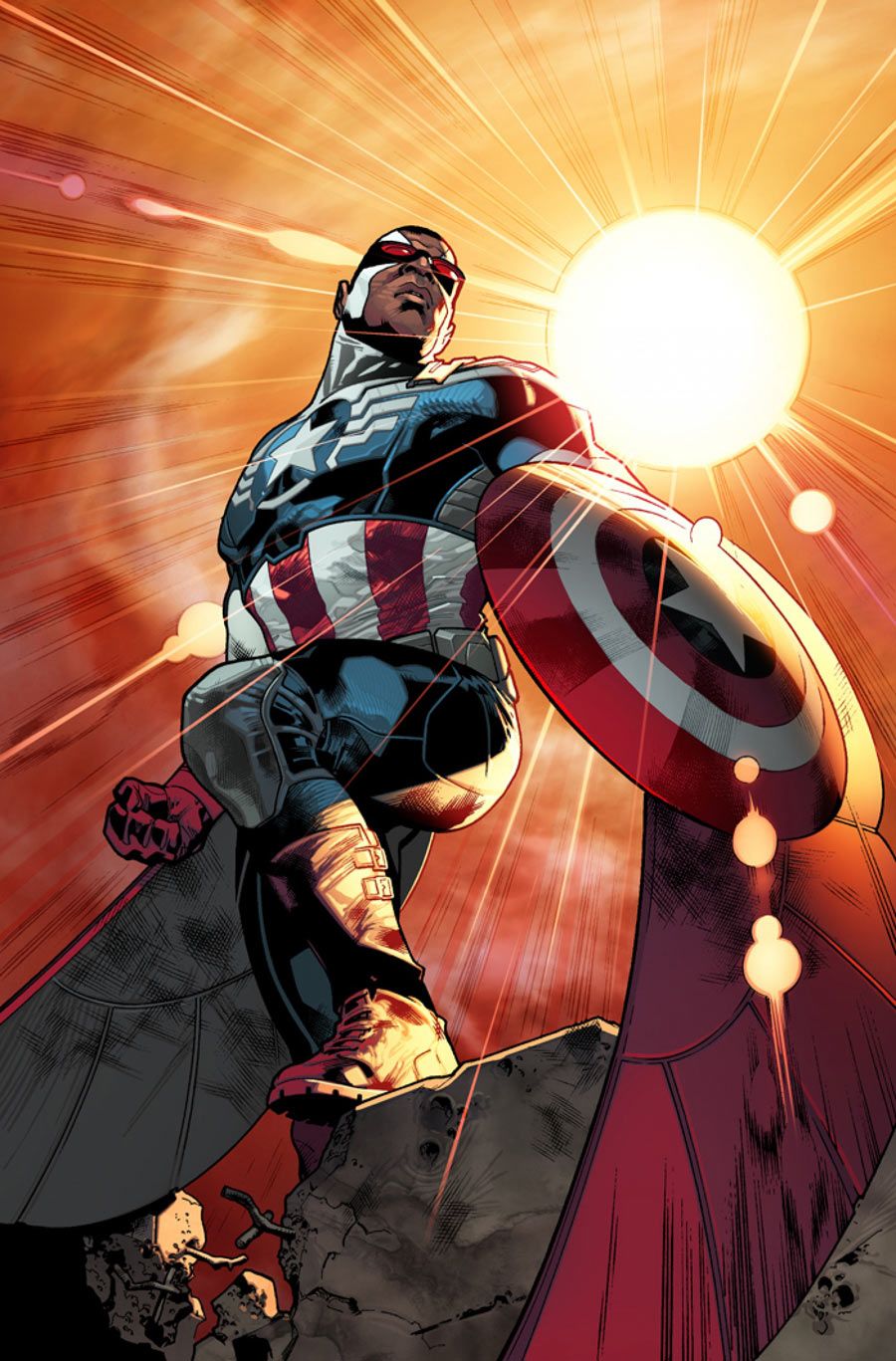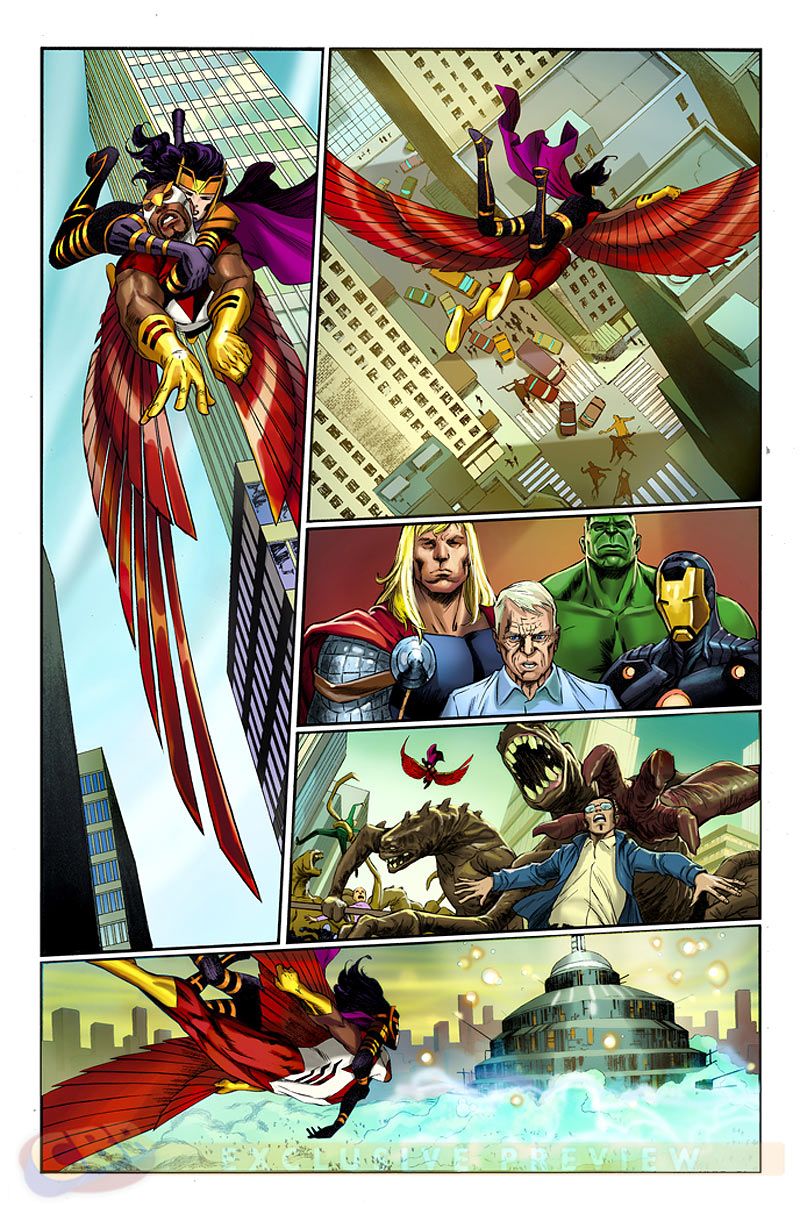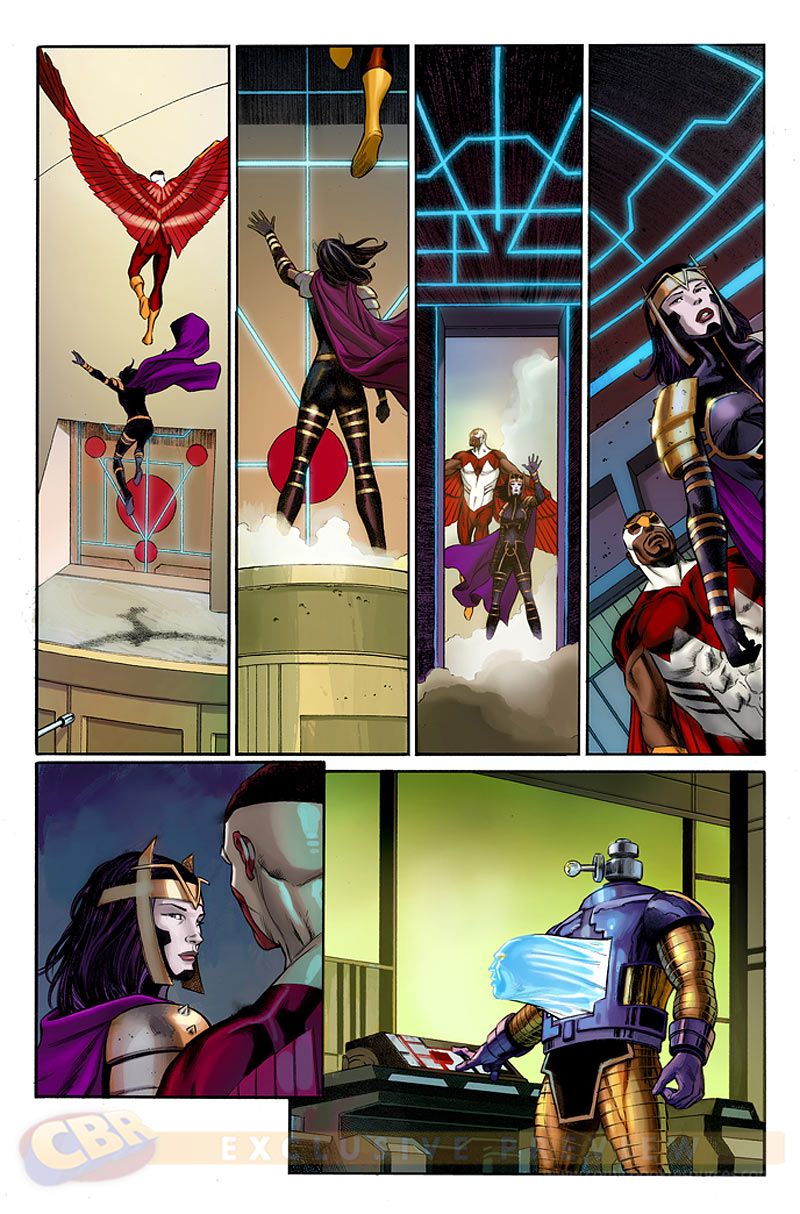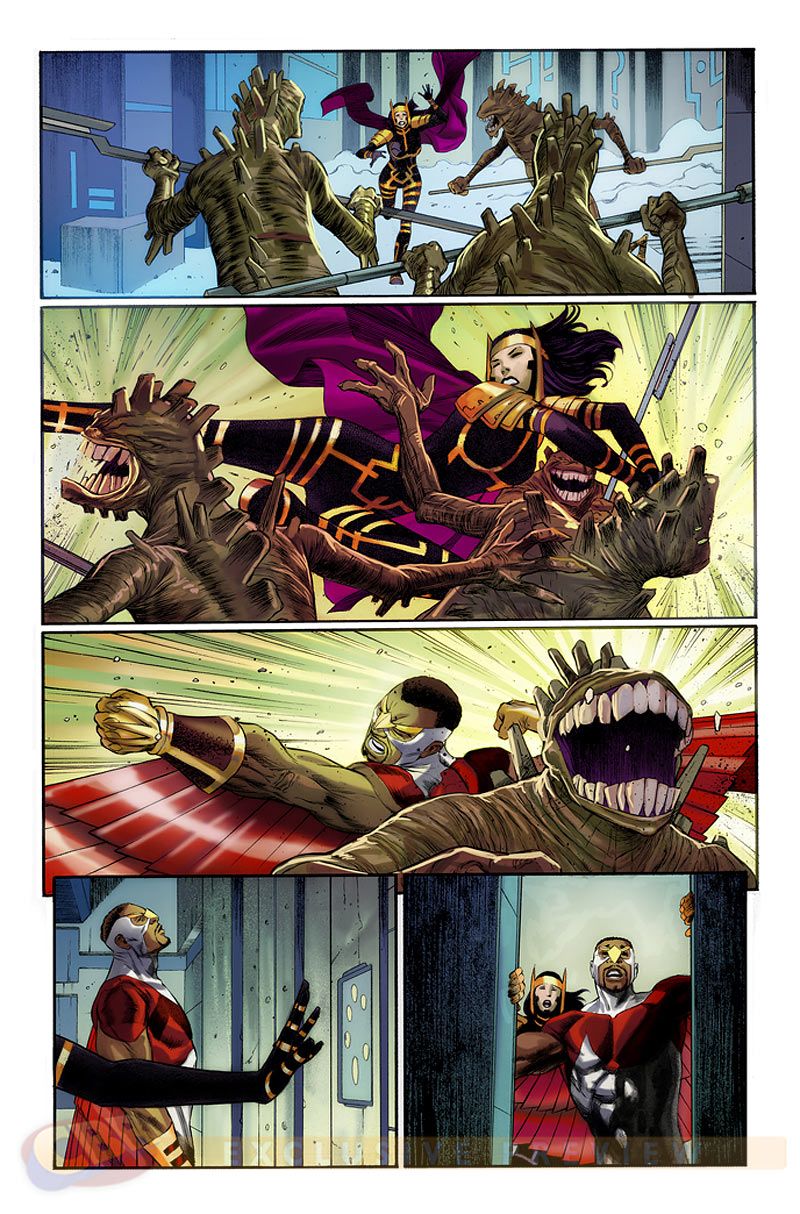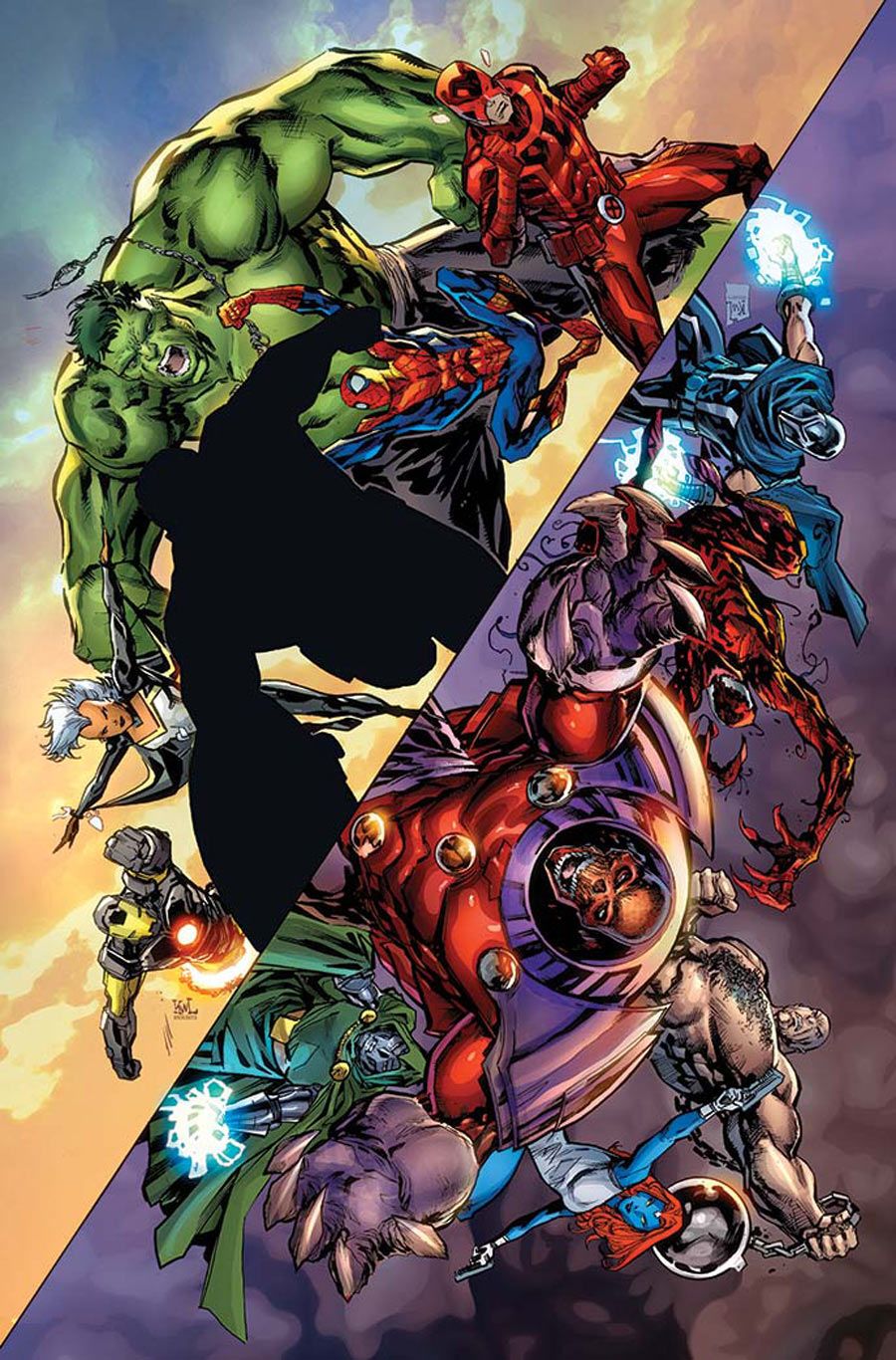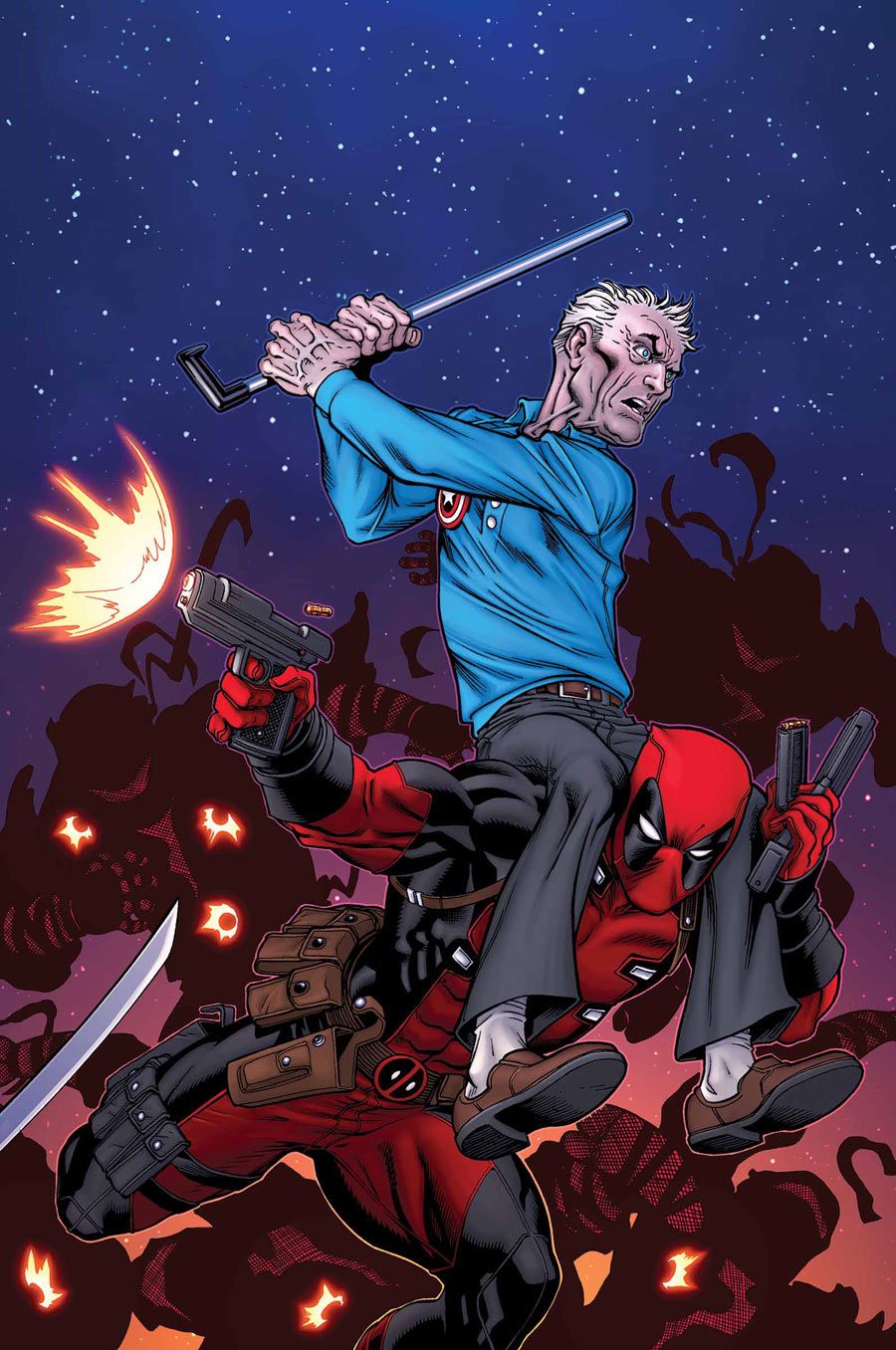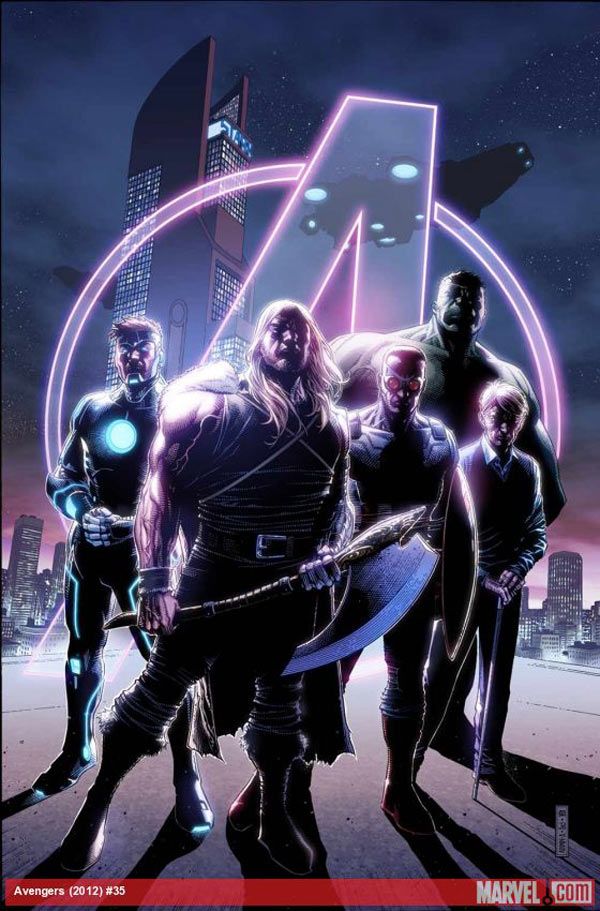When World War II broke out in the Marvel Universe, the United States government sought to create an army of physically perfect super soldiers. What its experiments wrought, though, was something infinitely more powerful: A living symbol that inspired acts of bravery and courage by embodying the ideals of their nation. That symbol is, of course, Captain America, a hero clad in a star spangled uniform and armed with an indestructible shield.
The Super Soldier Serum transformed puny Steve Rogers into Captain America, an identity he's laid to the side and picked up again a number of times over the decades. Rogers understands the importance of Captain America as a symbol, and is well aware that the identity can and should live on, even if he's no longer able to fight the good fight.
Falcon Picks Up the Shield in Remender and Immonen's "All-New Captain America"
Now that Rogers has been robbed of the Super Soldier Serum that kept him youthful and in top physical shape, it's time for him to choose his successor; in October's "Captain America" #25, by writer Rick Remender and artist Carlos Pacheco, Rogers passes his shield and identity on to his friend Sam Wilson, or as he's known to the Marvel U, the Falcon. We spoke with Remender about Wilson taking on the mantle of Captain America and his plans for the new high flying Sentinel of Liberty, which include a role in the "Avengers & X-Men: AXIS" event, and the "All-New Captain America" ongoing series, which kicks off in November and features art by Stuart Immonen.
CBR News: You're known for plotting out and writing long form stories that often run 25-30 issues in length. Now that we're nearing the end of your first major Captain America story, what can you tell us about the inspiration for Steve Rogers to pass the Cap mantle along to the Falcon? When did that idea come to you?
Rick Remender: When you're writing these stories, the best way to handle things is to think of the title as a creator-owned book, that you can do anything you want. In doing that, it forces you to come up with results and consequences that would seem frightening to you otherwise.
We've seen other people wear Cap's suit. What I concocted was an end goal that came about and didn't involve Steve being out of the picture, on the run, or dead. Steve is around, and it's a change that is as permanent as anything in comic books, without the reset button waiting. That's something you'd do in a creator-owned book, but it's not quite so easy to do with a character like Captain America. So as I was writing the "Dimension Z" storyline, I was thinking about the consequences of what was going to happen to Captain America, who had lost both his fiance and his son. This was what grew out of that.
A lot of what you see happening with Sam Wilson in the Nuke arc is going to inform the hero that he is. There's a scene in that story where S.H.I.E.L.D. has given him orders to take a camera from a reporter, and Sam leaves the camera with the reporter. That's an example of one of the differences between him and Steve. Sam is not a soldier. He's going to do what he thinks is the right thing and listen to his heart. He does not take orders. He does not follow the chain of command. His version of the American Dream and his ideology is different than Steve's.
I was building towards that point, and I believe it was somewhere during "Dimension Z" where my outlining hit the point and I realized that when we came back from that story, Sam would be caring for Steve. Sam would also be showing the ways in which he was different from Steve. Then, past that, Steve would be taken down and rendered incapable of becoming Captain America and Sam would take the mantle.

It's very much a staple of the mainstream super hero books, to have the status quo change, but it's also something that my editor Tom Brevoort and I talked about sticking with. It's not something that's going to be undone any time soon, if it's ever going to be undone. That's a real possibility, here.

Steve is still involved in the book as a tutor, a mentor, and the thing that he's best at, which is tactical operations. So when Sam is out in the field, he's talking to Steve, who is manning a computer back at Avengers Mansion and doing the best he can to help his friend plot a course. Steve never had that himself, and it really helps Sam.
One of the things that I'm focusing on is that Sam doesn't have the Super Soldier Serum. He's the everyman. He's a regular person like us, so his misfortunes inspire us and our empathy because they're our misfortunes. He doesn't have the Super Soldier Serum, but he does have the ability to fly, an empathic connection to Redwing or any bird, and he's got Steve Rogers back at command helping him run the missions.
You talked about how Sam and Steve have different training, which influences their perspectives, but at the same time, they both come from similar backgrounds in that they both grew up in impoverished environments, and they both lost their parents early on in their lives.
That is correct, and I think that is the connective tissue that informs their perspective. I don't know how to say this without potentially offending somebody, but it is an opinion I hold; I don't know many people who have lived lives of privilege that have true empathy for people who are in unfortunate situations, because they have not lived those situations. They have not been in a 500 foot square box with black mold in the walls, incapable of paying the bills and with a relative who's suffering from a disease that can't be treated because they don't have the money. They haven't been in a community riddled with crime. They haven't walked outside to get milk and been afraid of being shot at. Steve and Sam have both done that. They have lived that, and that gives them a deeper empathy as everymen to care for and serve not only their communities, but the world.
Sam's father was a preacher who inspired him, and he had that classic turn where, as a teenager, he saw his father's optimism and hope as extreme naivete. He thought his father was a dupe. Sam saw the racism and ugliness inherent in mankind as inoperable, but his father was this eternally optimistic preacher who people came from miles around to hear speak. It wasn't until his father was killed while trying to stop a fight that Sam realized what his father brought to the community and how important it was that somebody step up and fill his role.

That was what I considered the birth of a super hero. Then, the test of the super hero, the way he differentiates himself from a character like Batman, is that Sam's father was killed while trying to stop a fight, and Sam steps in and take his father's place and work in the community. While he's trying to do good and fill that role, Sam's mother is killed by a mugger. That's the test, because he stood up and tried to do the right thing, and fate handed him another blow.
That's the test in Sam's life that really showed his courage, and ultimately, he doubled down and tried to fulfill the roles both his parents had in the community. He then grew into a hero. That's the origin of Sam Wilson. It's not very well known, but when you piece it all together and boil it down, you see just how compelling of a character he is. It's what leads Sam to helping out beyond Harlem. Then, his community service becomes trying to bring relief supplies to third-world nations, which leads to him being shot down and landing on the Isle of Exiles. That leads to him teaming up with Steve Rogers who trained him to be the Falcon and take down the Red Skull. That choice to be a good man lead him to Steve and super heroics.
It was such a unique and wonderful origin. It's one of the reasons I wanted to try and elevate Sam and give him an opportunity to step out of Steve's shadow and become the main guy.
Steve and Sam are alike in their shared backgrounds, but one of the big ways in which they're different is that Steve is a soldier who sees things in terms of orders and objectives, while Sam is a social worker who who views the world from a larger sociological perspective.
Absolutely! And he questions authority more than Steve does. Steve is more of a generation where authority was trusted. Sam is from Generation X. He was a person who was raised post-Nixon, during a time when the government was no longer something that everybody naturally trusted. There was suspicion.
So that is a different kind of character. He still loves his country. He's still an optimist, and still believes in the American Dream, but Sam's American Dream is when it says "Freedom of the Press" and somebody in a military institution tells you take a photographer's camera, you don't take the camera. Because it breaks the rule and it breaks the heart of the rule.
I did that scene, knowing what was coming up, to really drive home the difference between Steve and Sam, and ultimately, there was a consequence. The information about Nuke and the slaughter in Nrosvekistan getting out caused harm. But the point is, if you're going to have freedom of the press, you don't waver from that.
Taking up the mantle of Captain America thrusts Sam into some areas that he doesn't have a whole lot of experience with, like wielding Cap's signature shield and being a leader. Does Sam initially have some trepidation in taking on those responsibilities?
He does not. That's going to grow out of the story that we're telling. There have been many stories where Sam was presented with the opportunity of being Captain America, and he declined it. This time, because of what happens and how he deals with it, he's ready to stand up. He feels, in his heart, he's ready be this person. He's ready to serve his community, his country and the world he lives in. So he earns this. There's a big earn in issues #24-25.

Sam is not a self-doubting substitute when he comes out of that story. He is Captain America.
Does this mean we'll see Sam embrace the leadership role of Captain America? Because when Bucky was Cap, he seemed more content to let his fellow Avengers take charge of situations.
Right. I think that Sam is somebody who still sees Steve as the tactician. Putting on a different costume isn't going to make Sam a better tactician. He's not automatically going to be perfect with the shield. That's going to play into a lot of story points coming up.

When it comes down to who can throw the shield, you've really got Steve Rogers and Ian Rogers, who he raised with the shield. Those are the two people who know that shield more than anything; the kid who grew up with it, and Steve, who always used it.
There have been other characters who have wielded the shield, but in my mind, Steve and Ian are the two experts with it. Sam is not expert, but he will be learning. He'll turn to Steve as a tactician, but he will be in a leadership position. That doesn't necessarily mean he's going to be in a loftier position than Steve, because Steve is still there. He's still got the guy who's been calling the shots and running the tactical game, but that might lead to some conflict because Sam is not going to be the guy who's going to listen to S.H.I.E.L.D. and say, "Yes, sir." He's a guy who's going to question authority, listen to his heart, and do things in a slightly different way.
Plus, ideologically, there's an argument to be had between Generation X and the "Greatest Generation." They're two generations, separated by the Baby Boomers, with very different experiences, very different outlooks on authority and the world in general. Sam greatly respects Steve. Steve is his best friend and his mentor, but Sam also has things he can teach Steve as well. We'll see how that all works out.
So in terms of dynamic, while it's not exactly like the animated series "Batman Beyond," it has a lot of the fun elements of that show.
Right -- you had the younger guy in the suit, and you had an older Bruce Wayne back at the cave telling him Joker is probably going to do this and that, which is a wonderful set up. This is a little different in that there are a few other wrinkles being thrown in here.
Having talked quite a bit about Sam, let's chat a little more about Steve. How would you describe his emotional state at this point? He's lost his youth and vitality, but has he possibly gained a sense of peace?
Steve has earned a respite. He earned not being killed of or chased off by his government, and he earned running the Avengers and still making a change by doing what he can. His mind is still sharp. He still has that fighting spirit, and he wants to serve. He no longer has to put his body into the grinder to do it though.
If anybody has earned that, it's a guy who's been fighting since World War II -- with a break in a glacier. [Laughs] But Steve earned that break, and I plan on giving him some happy days coming up because I've kicked him in the ass pretty hard. This was the plan: You break him down, and then you build him back up, with a new status quo and fun dynamics. With the characters that are going to be back on the board by the time we do "All-New Captain America" #1, you'll see it's a Cap family book. "Cap" #1-25 set it all up, and this really is getting to a lot of the wonderful payouts that I think a long story offers you and gives you the ability to earn.
Does "All-New Captain America's" family feeling mean Steve and Sam won't be the only ones doing crime fighting in the book?
I want to warn people about spoilers here. I'm going to talk about some news that's already out, but involves some big reveals in issues that aren't even out yet. So spoiler warning!
Okay, Ian Rogers is going to assume the role of Nomad. And as I said, Ian Rogers knows how to use that shield a lot better than Sam! [Laughs] Ian is somewhat brash and sarcastic. He's a warrior who spent the entirety of his life on the planes of Dimension Z; living off the land and fighting off the mutates of Zola.
So Ian is noble. He was raised by Steve. He's noble tempered with warrior in a way that neither Steve nor Sam are. There is a savagery within Ian. He is the offspring of Zola. It's nature versus nurture in terms of, is it's Steve's influence or Zola's DNA that's going to end being the guiding voice in Ian's life?
As Nomad, Carlos Pacheco has designed him. Dean White has colored him. The issue where he makes his first appearance is next month.
Okay, major spoilers done.
What about Jet Black? What can you tell us about her relationship with Sam?
Jet is a big part of the "March to AXIS" story. It's probably the last reveal that we haven't spoiled yet. So if you're a fan of Jet, her story is far from over and her relationship with Sam is going to develop some very interesting wrinkles by "Captain America" #25.
Sam becomes Cap in Issue #25, and it looks like you're giving him a baptism of fire that same month by shoving him into the middle of "Avengers & X-Men: AXIS."
The road leading to "AXIS" is connected to Zola and the Skull, and Sam is in the midst of trying to stop what's coming. The story itself and what happens is something that I've been growing for so long now, I'm hoping most people go into it without knowing every single beat.
What Sam does to earn being Captain America is pretty wonderful and makes some of the things that are coming not as awful for the heroes of the Marvel Universe. So in the "March to AXIS" issues of "Captain America," he's dealing with the Zola end of "AXIS." Then, after Issue #25, the story goes off into "AXIS" #1, which ships the next week.
The "Avengers & X-Men: AXIS" event will bring Sam and the Red Skull face to face. We know Cap has a history with the Red Skull, but the Falcon did, too. What's your sense of the enmity between Sam Wilson and Johann Schmidt?
Sam's empathic powers, his connection with Redwing and birds, is something that grew out of his adventure of trying to take down the Red Skull when he had the Cosmic Cube. The Red Skull is a guy who tweaked reality with the Cosmic Cube to create "Snap" Wilson, to try and defame Sam, which is something that we will be digging into.

There never was a "Snap" Wilson. "Snap" Wilson was a construct of the Red Skull. He was an attempt to defame Sam. So Sam has a very personal grudge against the Red Skull.
Sam's confrontation with the Skull is bound to attract the attention of S.H.I.E.L.D. What can you tell us about the new Captain America's relationship with the espionage agency?
What went on with S.H.I.E.L.D. in Nrosvekistan will inform the scenes between the young Nick Fury and Sam Wilson. These are guys who have different ways of going about things. Sam is transparency; Nick Fury is subterfuge.
I don't want to give away anything more than that. There is a S.H.I.E.L.D. presence. There is a relationship. The relationship between Sam and S.H.I.E.L.D. plays a big role in "AXIS" beginning in Issue #4, and then will reconnect back into the Cap series once "AXIS" is over.
Sam plays a role in "AXIS," but does the "All-New Captain America" series kick off with a tie-in to the event?
It didn't make any sense to launch "All-New Captain America" #1 and have it crossover into the event, so the Sam story that happens in "AXIS" happens in "AXIS." I don't want to divulge yet where in continuity "All-New Cap" #1 comes, whether it's before or after, because it would give away the ending of "AXIS."
"All-New Cap" #1 is its own story, and it begins the infiltration of HYDRA. We're making HYDRA the A-List level monsters of the Marvel Universe, and this is the beginning of that story.

If you've been enjoying "Cap until this point and are excited for "AXIS," the "March to AXIS" tie-ins lead into the event, and then you'll see Sam's story in the actual event miniseries. You can also read "All-New Cap" #1 and get a new story taking place at a different point in time.
Does turning HYDRA into an A-List level terror organization mean they'll become less about guys in green costumes with guns and more about operating from the shadows?
Yes and no. The reveals we have in store for HYDRA are many. I will say that all of Cap's rogues gallery have spread to the wind. We've seen them in a number of other books, but they're all coming back to Cap. All the big Cap villains will have a chance to be back in the spotlight. That will have a lot of connective tissue to what we're building here -- the new Cap is going to be tested pretty quick.
Artist Stuart Immonen is bringing "All-New Captain America" to life. How does it feel to be working with such a versatile guy who's known for both his action and acting scenes?
I'm going from Carlos Pacheco, who designed the new Cap and new Nomad, and is doing the work of his career on these lead-in issues, to Stuart Immonen, who is without a doubt the best of the best. And he's not only the best of the best -- he can also do regular, monthly comics. He's like a rare mutation of comic book artist. He is perfect at big, dynamic, clear and exciting action. And, like you said, he sells emotional and human scenes. There are some pages that have come in from him already and I just couldn't be happier. With Wade [von Grawbadger] inking him and Marte [Gracia] coloring him, we've got that whole team back together.

So we've got Carlos and Dean White doing the work of their career, building the story up. Everything that we've been seeding is finally paying off with two of the very best art teams in comics in comics to bring it together
Finally, can you tell us about "All-New Captain America's" place in the larger scheme of your run? Is this Act Two of a multi part, but not necessarily three act story?
The first series itself is really kind of three acts. If you want to pull back for a very macro view of it, that has it's own three acts and then ends with a change of the familiar into a new world.
I would look at "All-New Captain America" #1 as a whole new movie. This new story builds out of what happened and is informed entirely by what happened, as people demand and want in their super hero comics, but at the same time is entirely its own thing; a new story with new threats. It's a new mega-arc.
It sounds like you're reinvigorated and ready to dive into this new series.
I am. I don't know if I'll ever be able to write all my ideas for Sam. Those ideas poured out of my head and into a document that is 20-pages long at this point. HYDRA is the big focus, as Zola was in the first story, and the HYDRA story will have ramifications and consequences that are far reaching. You've never seen HYDRA succeed in this way. The kind of things they're going accomplish are going to be incredibly exciting and have a big effect on the entire Marvel Universe.

